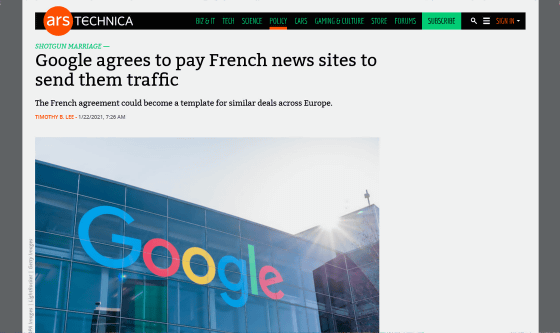Google agrees to pay 'news royalties' to French news outlets

Google extracts article information from the content of various news media and distributes it to its search result screen and
Le blog officiel de Google France: L'Alliance de la Presse d'Information Générale et Google France signent un accord relatif à l'utilisation des publications de presse en ligne
https://france.googleblog.com/2021/01/APIG-Google.html
Google, French publishers sign copyright news payment deal
https://apnews.com/article/business-europe-copyright-france-f3b01ddc5a374e90d6d3c43f9114893f
Google agrees to pay French publishers for news
https://www.cnbc.com/2021/01/21/google-agrees-to-pay-french-publishers-for-news.html
Google agrees to pay French news sites to send them traffic | Ars Technica
https://arstechnica.com/tech-policy/2021/01/google-agrees-to-pay-french-news-sites-to-send-them-traffic/

It has been pointed out for several years that 'Google has not paid the media for the use of content,' and Western countries have continued to demand payment from Google. However, Google has taken a stance of refusing to pay, and in 2014, in Spain, where a bill was passed that 'mandatory to pay royalties when quoting publications or pasting news links' Google has discontinued the Google News service as of December 16, 2014.

By Alain Bachellier
In Europe, copyright law has been amended in response to the digitized society, and the copyright directive in the digital single market that came into effect in 2019, such as Google, which is profitable by reusing content Businesses are obliged to pay the creators of the content.
France was one of the first to enforce domestic law based on this directive, but Google countered it by 'remove the text snippet of the text from the news content display screen and display only the headline and URL'. In response, French regulators accused 'the removal of snippets to avoid payments was an abuse of a dominant position in Google's monopoly market,' and urged them to negotiate with content publishers. .. Google continued to resist, but in October 2020 a French court dismissed Google's appeal and ordered it to negotiate with publishers about content usage fees.
And in a statement on January 21, 2021, Google announced that after months of discussions with the French press, a framework for individually negotiating royalties with each publisher was finalized. Under the new framework, payments will be made based on the amount of content published and traffic.
'This confirms Google's commitment to adequate compensation for publishers under French law and opens up new opportunities for publisher partners,' said Sébastien Missoffe, CEO of Google France. We are pleased to contribute to the development of publishers in the digital age and to further support journalism. ' Google has already negotiated payments individually with major French newspapers such as Le Monde and weekly magazine l'Obs .

Technology media Ars Technica surrendered in France, saying, 'The EU's passage of copyright law directives has created a united front against Google, making it harder for Google to resist.' He pointed out that this further weakened Google's position in future negotiations.
Related Posts:
in Web Service, Posted by log1h_ik






